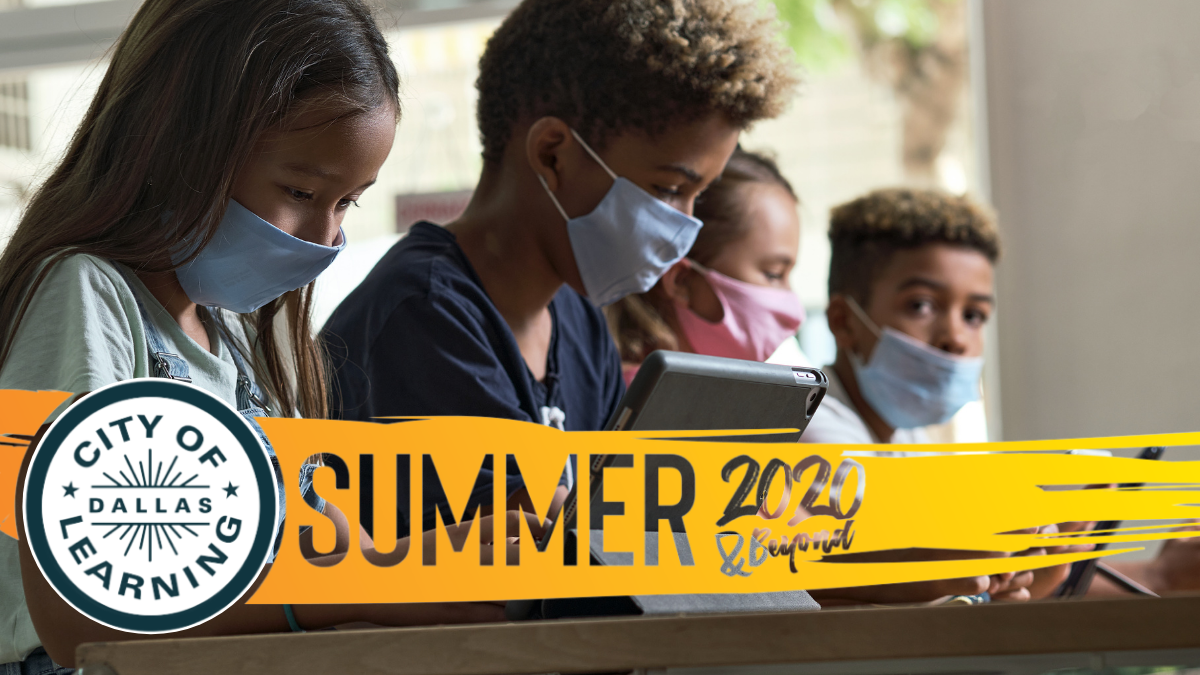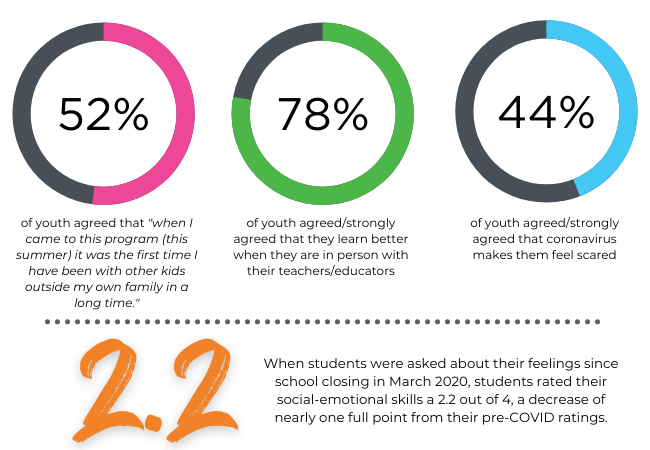COVID-19 Impact on Student Learning & Social-Emotional Skills During Summer & Beyond

Annual Dallas City of Learning Report Finds a Negative Impact on Social-emotional Skills and Majority of Surveyed Students Say They Think They Learn Better In-person
DALLAS, TX, February 10, 2021 – Through a public-private partnership, Big Thought, its Dallas City of Learning network and the Center of Research and Evaluation (CORE) at Southern Methodist University (SMU), published the results of its annual Dallas City of Learning (DCOL) Summer 2020 Report. This year, surveys and interviews included new items specific to the COVID-19 pandemic to understand the effect of the pandemic conditions on programs and students. Surveys and interviews were conducted through Dallas City of Learning programs with students, caregivers and program staff.
Key findings from the report include:

“Our beginning of year assessments indicate that students experienced 3.2 months of instructional loss from the closures, in addition to the typical 2.5 months of summer learning loss,”
said Texas Education Commissioner Mike Morath. “There’s a lot of ground we need to make up and it’s going to take all of us, including our out-of-school program partners, to address this significant learning loss. Organizations like Big Thought and the Dallas City of Learning system have necessary infrastructure that can be part of the solution.”
One of the most important allies in education are caregivers of students. Dallas City of Learning surveyed 292 caregivers who had students in summer programs.
- Caregivers reported that adaptations made to Dallas City of Learning programs for summer 2020 were satisfactory: caregivers agreed/strongly agreed that the program met their family’s needs this summer for a socially distanced learning opportunity (5.69 out of 6) and that the way the program was delivered made them feel like their child was safe
- Caregivers were asked to rate how much of a stressor they consider a variety of concerns to be. The two highest rated concerns were “racism and protests in our city” and “keeping children busy and engaged during the summer”
“We are really impressed that our network of community learning partners were able to create innovative programming for students this summer,”
says Sergio Antonio Garcia, Senior Manager, Learning Systems for Big Thought. “Collaborating across in-school and out-of-school programs will be critical to support our students and their families as we row through these unchartered waters together.”
During the summer of 2020 Dallas City of Learning partners provided 1,049 virtual and in-person program opportunities resulting in 1,480,961 cumulative hours of programming. Sixty-six percent of program leads reported that they made significant alterations to their programming for summer 2020, and 68 percent said that they are likely to continue with the adaptations they have made well after the COVID-19 pandemic ends.
“In the midst of major stressors, the Dallas City of Learning ecosystem adapted quickly. Many partners reported that they plan to keep some of these changes for the long-term,”
says Dr. Annie Wright, Executive Director, Center on Research and Evaluation for SMU. “In spite of these rapid adaptations, the pandemic widened the opportunity gap. The out of school time ecosystem will be a critical resource for meaningfully addressing learning losses.”
The National Education Association (NEA) highlights that our education system was built for an economy and a society that no longer exists. Learning to read, write and do math alone is insufficient. The NEA recommends educators focus on the “Four C’s” to help ensure students are prepared for success in a 21st Century world:
- Critical thinking and problem solving
- Communication
- Collaboration
- Creativity and innovation
Allison Bone, Vice President, Communications for Boeing Global Services shares, “Boeing is committed to ensuring the next generation of talent is as prepared as it can be to succeed in the 21st Century. We’re investing in efforts that help close the opportunity gap so that education and career opportunities are increasingly equitable. We have contributed toward these goals through a $200,000 investment in Big Thought and encourage other leading organizations to challenge themselves to invest in our shared future.”
“We are really fortunate to be part of an education community that is open-minded and collaborative. Having the Dallas City of Learning network already established has enabled us to respond to the pandemic in a unique way,” noted Byron Sanders, Chief Executive Officer of Big Thought. “We have an opportunity coming out of this crisis to evolve education for the better and our team is ready for it.”
The findings from the Dallas City of Learning Summer 2020 report can be reviewed in detail at: https://dallascityoflearning.org/info/summer-2020-insights/.
For more information about becoming a Dallas City of Learning partner, please visit: https://dallascityoflearning.org/partner.
